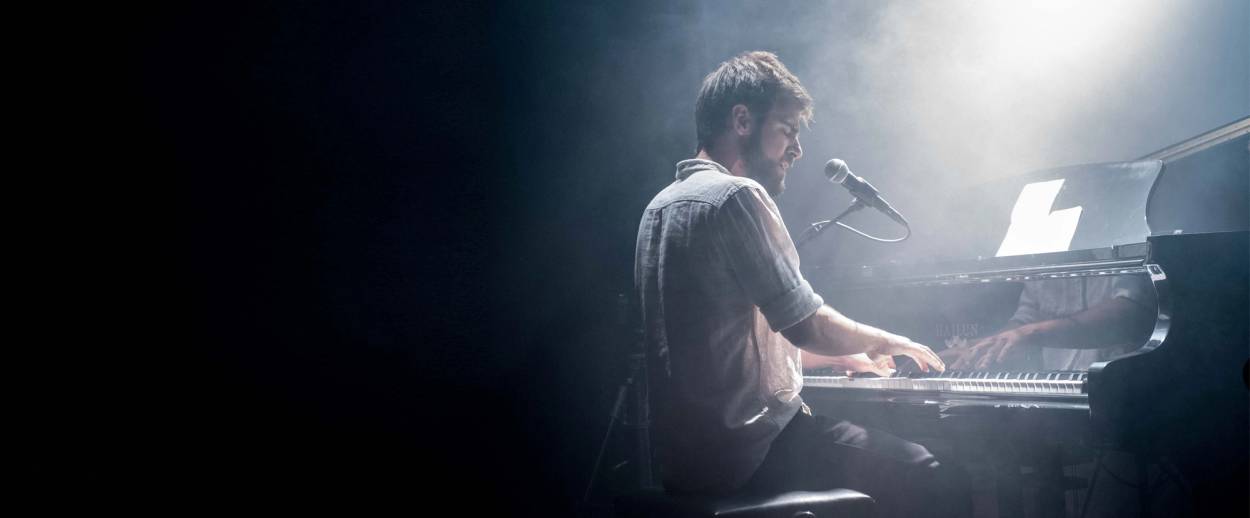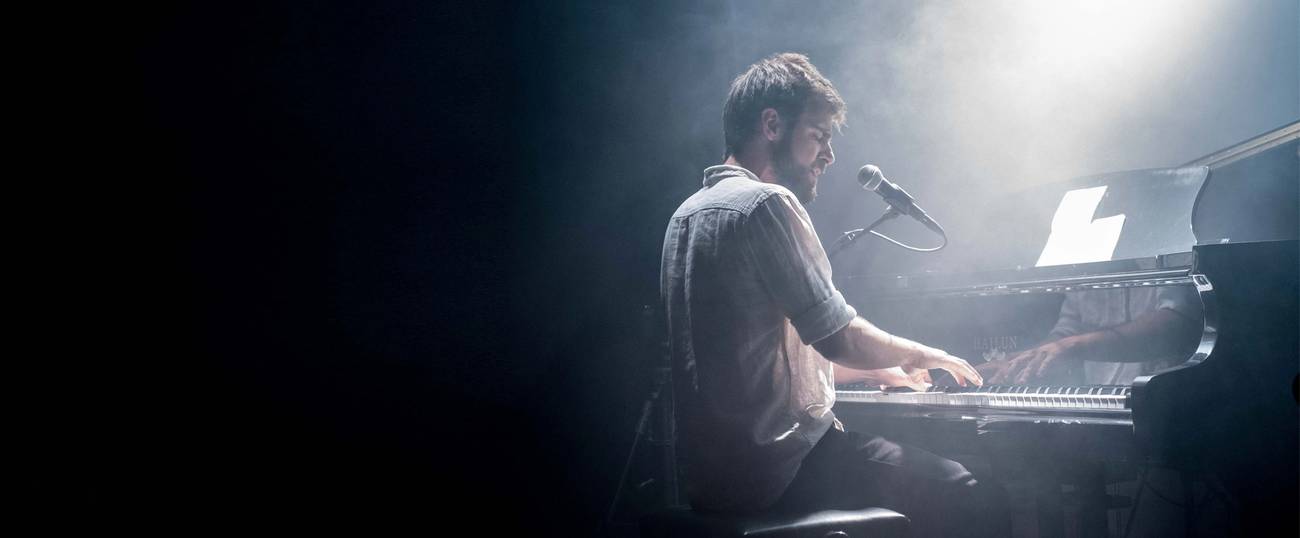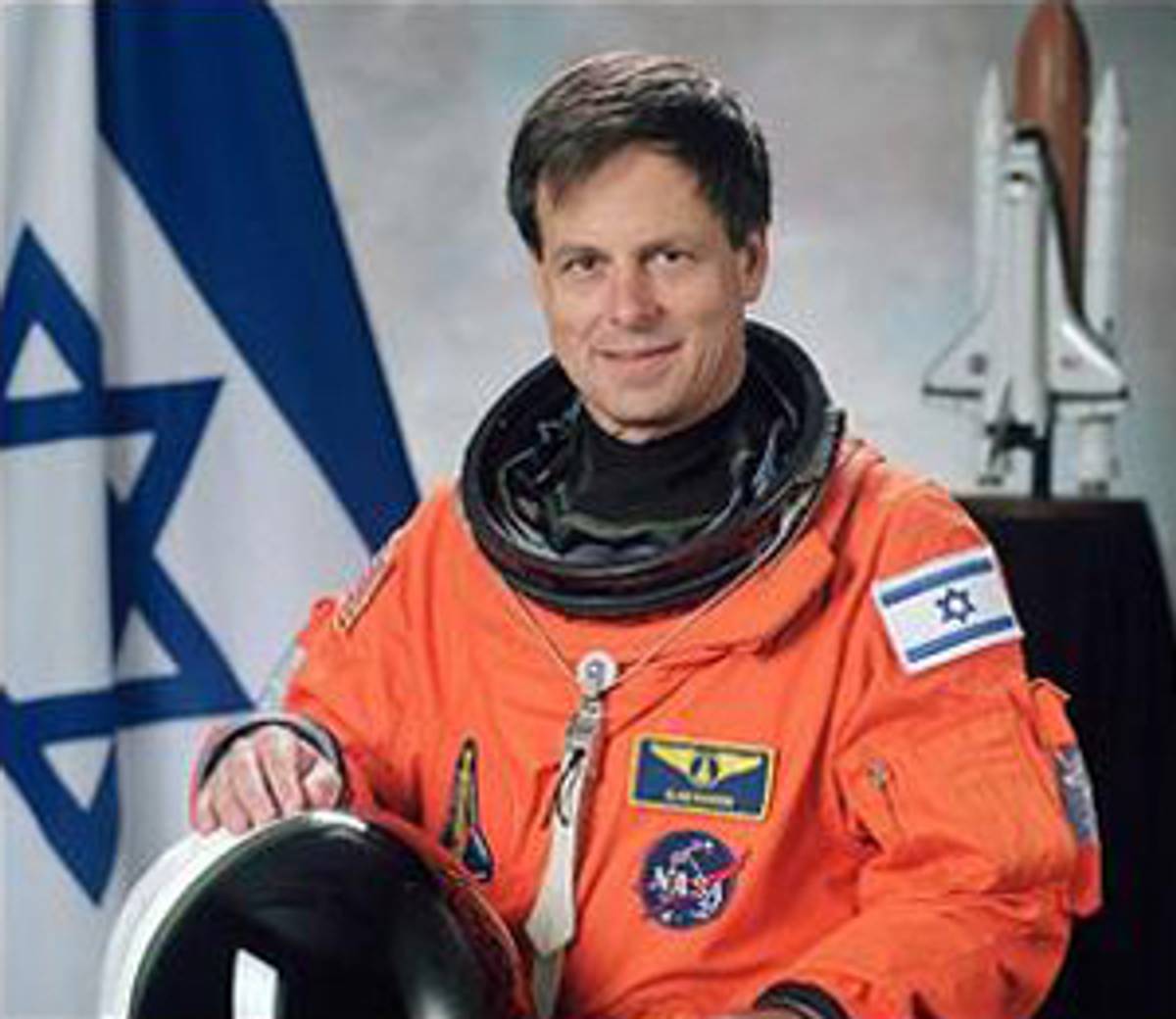Ramon’s Piano
An Israeli rock musician faces repeated public family tragedy head on, to emerge from the long shadow of his hero father, Israel’s first astronaut




In 1974, 20-year-old Ilan Ramon, a recent graduate of the IDF flight school who would go on to become Israel’s first astronaut, bought a Steinway piano that had once had its home in Germany during World War II. Ramon, the son of a piano teacher who survived Auschwitz, spent his entire first paycheck on it. This piano symbolized the survival of the Jewish people—a people that could make new melodies in the homeland.
The piano is now at the Tel Aviv apartment of Ilan’s second son, Tal, who just released his first album, Character (Dmut in Hebrew). “The piano gave birth to this album,” he said in a recent interview in Hebrew in his Tel Aviv apartment, “which I dedicate to my father and to Assaf.”
Why the dedication? Every Israeli is bound to be familiar with his family story. Israel rejoiced when Ramon’s father, Ilan, the youngest fighter pilot to take part in the strike against the Iraqi nuclear reactor at Osirak in 1981, became the nation’s first astronaut following a sweetheart deal President Bill Clinton struck with Prime Minister Shimon Peres in 1995, shortly after Yitzhak Rabin’s assassination. Joy gave way to grief when in 2003 Ilan was killed in his first space mission along with the other six crew members of the Columbia space shuttle. He was laid to rest in the military cemetery in Moshav Nahalal in the Jezreel Valley, near the Ramat David air-force base where he was previously stationed.
Six years later, Assaf, Tal’s eldest brother, graduated first in his class at the flight school in Hatzerim, Israel’s most prestigious military training ground. The nation gushed at the sight of Shimon Peres, now president, awarding Assaf his pilot’s wings and hugging him in a display more of fatherly pride than authoritative acknowledgement. The Ramons’ private moment, Peres told the family in his speech, was shared by all Israelis whose “hearts beat with love and excitement.”
September came and the family was, sadly, front-page news again. In a training exercise in the southern West Bank, Assaf apparently blacked out, and his F16-A crashed in a fatal accident that led to training reforms. Special television broadcasts and newspaper headlines covered the funeral, in quasi-national mourning. President Peres eulogized the son who was buried next to his father: “The Ramon family’s private son was, and had become, the son of us all.”
The Ramon’s second son, Tal, now expresses his personal grief through music. “Until now I haven’t shared my story with the public,” he said. “Everybody tried to guess what I was going through. The songs were written from an inner place that called out, now I want to tell my story—a story in which loss prevails but that is also inspired by other feelings. It’s an attempt to understand who I am and what defines me. I called the album Dmut because it also means character in English. It’s an inquiry into, and a creation of my own character. The discovery began in my private room, as a coping mechanism and an attempt to rebuild myself.”
The musician, who has yet to emerge onto the national stage himself, began his study at his father’s encouragement, in America. “I alternated between electronic keyboard and guitar,” he said, “since we didn’t bring the piano with us. It was important to my dad to listen to me. Shortly before dad flew to space, he left me a letter: ‘Keep on playing music, and know that I will always listen to you.’ ”
***
Tal Ramon grew up in the air force bases Tel Nof, Hazor, and Ramat David until the family moved to the upper-middle-class town Maccabim-Reut. It was a familiar trajectory of an air force family until the relocation to Houston, Texas, home to the NASA Astronaut Corps in 1998. It was a trying time for the 7-year-old Tal who had to cope with the “uprooting.” “I had to create a new life for myself. Of course there were many difficulties, but we’d always been very proud of dad, both in Israel and during his work for NASA. No one doubted the move was the right thing to do. I loved to watch him training in the special huge swimming pool where astronauts train wearing spacesuits.”

Ilan was assigned to the Columbia, but NASA repeatedly delayed the mission until the big moment came on Jan. 16, 2003. “For two weeks, we closely followed the NASA Television, an astronaut Big Brother of sorts. When the Columbia was due to land, the crew-members’ families got together. We counted down in anticipation. The timer reached zero and then started to count up. We gradually realized that something was off. We were escorted to a room, and an official eventually told us what had happened. At first it was impossible to comprehend.”
The visit to Israel for the funeral and shiva was a cultural shock. “We witnessed the beauty of the Israeli spirit, especially the great love and support, but also its less palatable sides—the boundaries of privacy.”
A year and a half later Rona, a physical-education teacher and later a psycho-spiritual coach, and her four children returned to Israel and settled in Ramat Gan. Ramon, then 14, had to shoulder the double burden of a national and personal grief and to learn to be Israeli anew. “People think that when you return to Israel all you need is to reacquire the language, but it cuts much deeper,” he remembers. “You need to reconstruct your Israeli character, to recalibrate your identity.”
The sense of alienation, along with the cultural differences, was also the fountain of creativity. “I’d sit in our basement for hours on end, into the night, and try to understand who I was through lyrics and music, letting my feelings flow out. The music was an antidote to alienation.”
Ramon contrasts his challenges with Assaf’s successful adaptation. “Everybody who met him immediately fell in love with Assaf. He was such a good person that he didn’t trigger any feelings of envy. We had a mature and supportive relationship, without anger or jealousy. I loved him dearly. I admired him. When your big brother is so handsome and accomplished, all you want is to emulate and learn from him.”
From an early age Assaf was set on walking in the father’s footsteps, declaring in first grade that he wanted to be “either a pilot or painter.” He eventually chose the first, and his mother gave the required family consent for the flight course. The public attention on the graduation ceremony occasioned a moment of brotherly intimacy. “When the ceremony was over, Assaf asked that I’d help him escape the press. Like a bodyguard, I put my arm around him and shielded him. We rushed, bent over, to a safe space in one of the tents. Some hundred friends and relatives wearing T-shirts with ‘I Love Assaf Ramon’ were in attendance. Everybody thought he was so deserving. That he fought so hard for self-actualization. We were so proud of him.”
***
When Assaf’s plane crashed, Ramon was a drone operator in military service in the air force. It’s still hard for him to speak about the reencounter with the intrusive press that lurked outside the family home, through which his mother first realized that something terrible had happened. “We felt we were anew under the same attack we had experienced after dad’s death. At this most difficult moment we were exposed and lacked any sense of control. My mother channeled the anger to activism, advocating a more sensitive treatment from the press in similar situations. I hope the change will remain.”
During Assaf’s shiva Tal wrote the first draft of “The Black Cat” (Ha’hatul Hashahor) on the empty space left at his home after his brother’s death—the subject of many of his songs. “Recently I found a birthday letter he wrote me in which he tells me how much he’s proud of me for choosing my own path. Had things been different, we might have become the new Ramon(e)s.”
Dmut feels almost like a photo album or an intimate diary. One moment we’re in a room with memorial candles, and the next, in the Negev dunes. Yet another track takes us to the North India vista seen from the village Khirganga, where he traveled after army service in what he calls “one of the most significant experiences of my life. Being there reinforced the idea that everything is temporary, and that we must live in the present and accept loss.” (He also spent a summer working in a Jewish Agency summer camp in Texas.) But underneath it all is pain. At times he confronts the pain, at times adopts it, almost cherishes it. “Emotional coexistence,” in his words.
A couple of months ago the Israeli rocker Aviv Geffen invited him, on Facebook, to perform at Neshef Rock, a musical event. Geffen said, “I felt he’s spot on, musically, and is influenced by the right things such as James Blake and Thom Yorke. People who heard him perform liked him very much, and I’m curious about where he’s heading. I believe he’s got great prospects.”
On May 1 Ramon launched Dmut in Zappa, an iconic nightclub in Tel Aviv where he previously waited tables. In perhaps the highlight of the show, Ramon called his sister Noa to the stage for a duet of “Blackbird,” which he used to sing with Assaf. Their mother Rona, in the audience, couldn’t but watch with tears in her eyes.
About $15,000 of the funding came through Headstart, an Israeli crowdfunding website, where more than 300 individuals chipped in. Though Ramon says that he wants his music to be judged on its own merit, he’s not coy about his family’s pedigree, which is clear from the first single “Taking Off, Landing,” (Hamra’a, Nehita). “I wanted to face the issue heads on and not to dance around it,” he said. “It was my way of saying: ‘Come on, I’m facing this. I’m not hiding.’ ”
***
Like this article? Sign up for our Daily Digest to get Tablet Magazine’s new content in your inbox each morning.
Tal Miller, a former speechwriter for the IDF’s chief of staff, is a writer for Yediot Aharonot. Yoav Sivan is a New York-based journalist.